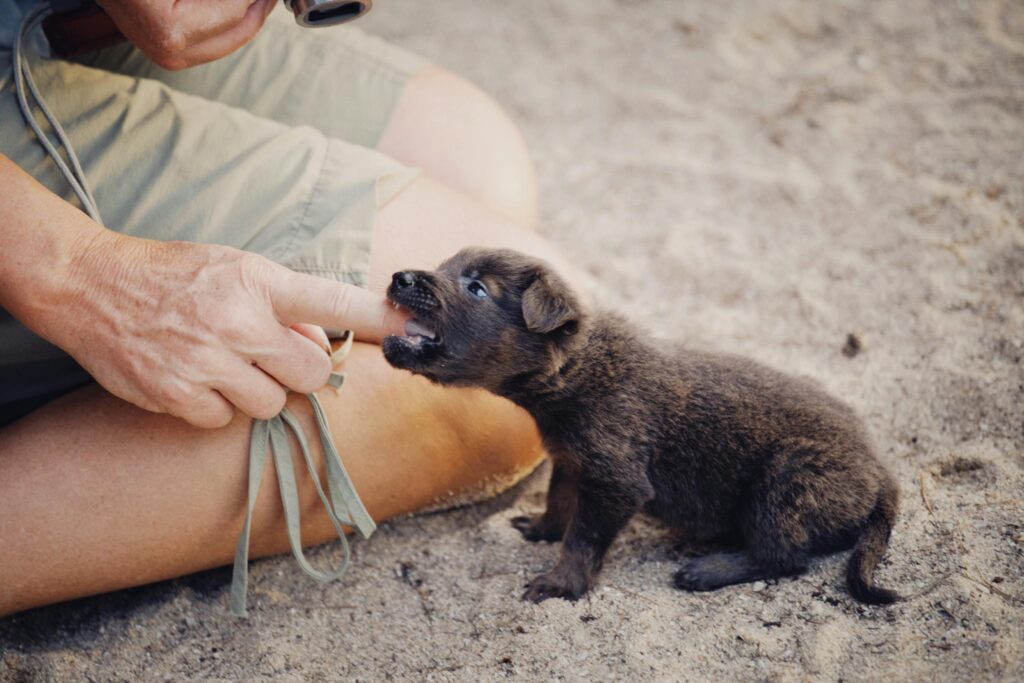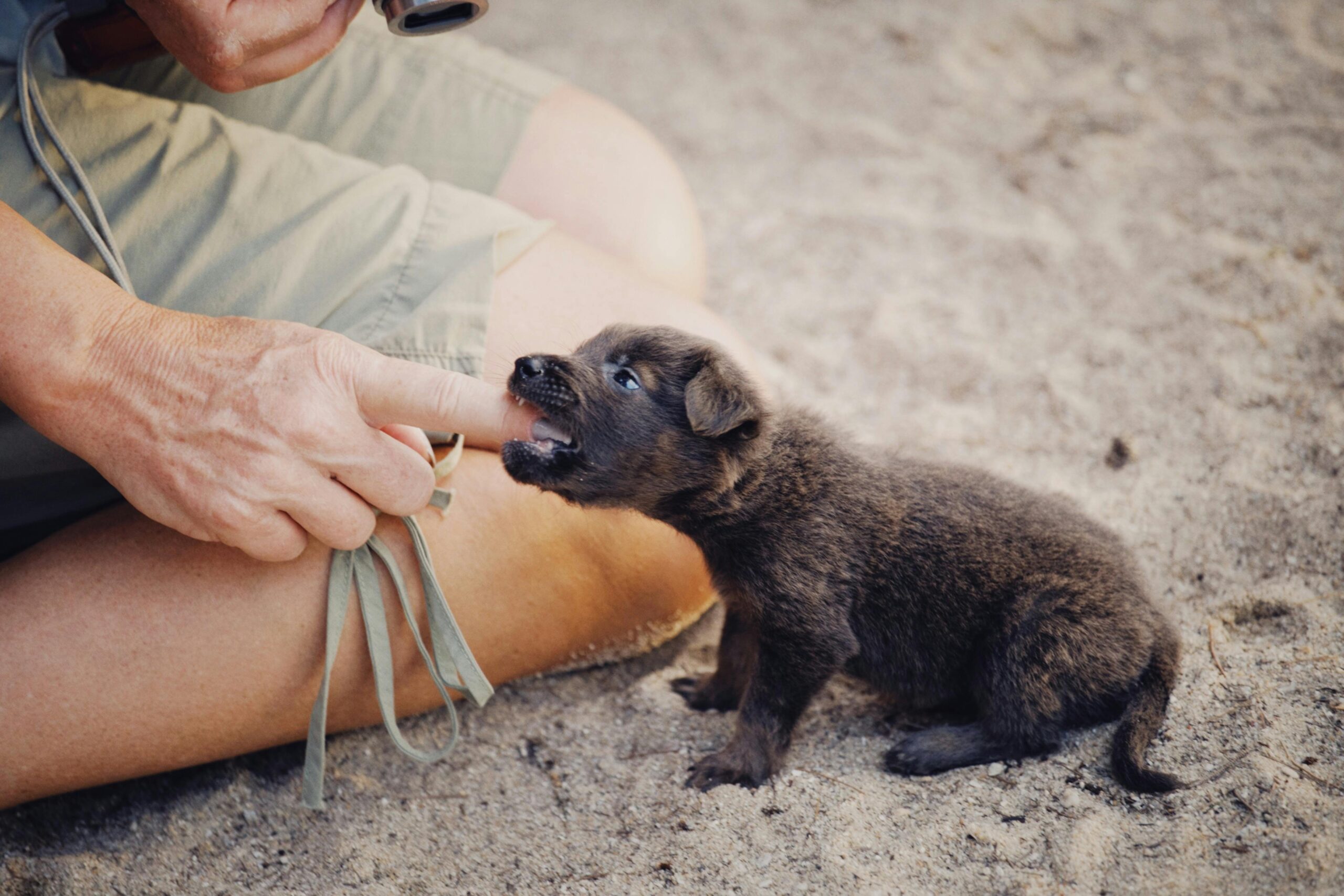Puppy biting is a common issue for new dog owners. Puppies naturally use their mouths to explore the world, which can lead to biting and nipping. While this behavior is normal, it’s essential to train your puppy not to bite people or household items. Without the right guidance, puppy biting can become a frustrating habit that is harder to break as they grow.
In this comprehensive guide, we’ll discuss why puppies bite, when they typically stop, and most importantly, how to stop a puppy from biting with proven training techniques.

Table of Contents
- Why Do Puppies Bite?
- When Do Puppies Stop Biting?
- How to Stop a Puppy from Biting: Step-by-Step Guide
- Common Mistakes to Avoid
- Conclusion: Download Our Free eBook
Why Do Puppies Bite?
Puppies bite for several reasons, all of which are natural but need to be redirected. Common causes include:
- Teething: Between 3 to 6 months old, puppies start teething, which can cause discomfort. Biting and chewing help relieve this pain.
- Play Behavior: In the wild, puppies play by biting their littermates. It’s how they learn bite inhibition, or how to control the force of their bite.
- Exploration: Puppies use their mouths to explore objects, much like humans use their hands.
- Attention Seeking: Sometimes puppies bite to get your attention, especially if they’re feeling bored or overstimulated.
While these behaviors are normal, it’s important to train your puppy to stop biting people and inappropriate objects.
When Do Puppies Stop Biting?
Typically, most puppies stop biting by the time they reach 5 to 6 months of age. However, this depends on how early you start training them to control their bite and redirect their energy toward acceptable behavior, like chewing on toys.
By teaching bite inhibition early on, and providing consistent training, you can help your puppy understand when it’s okay to chew and when it’s not.
How to Stop a Puppy from Biting: Step-by-Step Guide
1. Teach Bite Inhibition
Bite inhibition is teaching your puppy to control the force of their bite. If your puppy bites too hard while playing, let out a loud “ouch” and immediately stop the play session. This mimics how their littermates would react to a painful bite, teaching them that hard biting ends the fun.
2. Redirect to Chew Toys
When your puppy bites, immediately offer them a chew toy or appropriate object to bite. Puppies naturally need to chew, especially when teething, so providing toys helps them focus on the right objects. Whenever they chew on the toy instead of your hands or feet, praise them.
3. Use Positive Reinforcement
Reward your puppy every time they exhibit gentle behavior. Positive reinforcement in the form of treats, praise, or playtime teaches your puppy that being gentle brings rewards. Ensure that you reward them right after they stop biting or choose a toy over biting a person.
4. Practice Socialization
Socialization with other puppies or well-behaved adult dogs helps teach your puppy about appropriate behavior. During puppy playtime, other dogs will naturally correct your puppy when their bites are too hard. This further reinforces bite inhibition.
5. Consistent Training
Consistency is key in training your puppy. If you allow biting one day but discourage it the next, your puppy will be confused. Make sure everyone in your household follows the same rules about biting. Use the same commands and methods to correct the behavior so your puppy can learn faster.
6. Avoid Rough Play
Avoid using your hands to wrestle or engage in rough play with your puppy. This teaches them that it’s okay to bite your hands. Instead, always use a toy for playtime to avoid sending mixed signals.
7. Use Time-Outs
If your puppy keeps biting despite your efforts, use a brief time-out. Stop all play and ignore your puppy for 30-60 seconds. This teaches them that biting means the fun stops. After the time-out, resume play when your puppy is calm and biting-free.
Common Mistakes to Avoid
Training a puppy not to bite can be challenging, and it’s easy to make mistakes. Avoid these common pitfalls:
- Inconsistent Training: Make sure everyone in the household is on the same page when it comes to correcting biting.
- Punishing After the Fact: If you punish your puppy after they’ve bitten, they won’t understand why they’re being scolded. Correct the behavior immediately when it happens.
- Rough Play with Hands: Don’t encourage biting by using your hands during play. Always use a toy to engage with your puppy.
How Long Does It Take to Stop Puppy Biting?
The time it takes to stop puppy biting depends on your puppy’s breed, age, and the consistency of training. Most puppies reduce biting by 4 to 6 months, but some may need longer, especially if they’re highly energetic or weren’t trained early on. Stay patient, and keep reinforcing positive behavior.
Conclusion: Get Additional Help with Our Free eBook
Puppy biting is a normal part of development, but with consistent training, you can teach your puppy not to bite. By redirecting their biting to appropriate objects, using positive reinforcement, and avoiding common mistakes, you’ll help your puppy develop good behavior that will last a lifetime.
For more in-depth advice and expert tips on training your puppy, download our free eBook today! It’s packed with additional strategies and insights to help you successfully raise a well-behaved dog.
FAQs
- How can I stop my puppy from biting me?
Use bite inhibition techniques, redirect to chew toys, and reward gentle behavior to stop your puppy from biting you. - When will my puppy stop biting?
Most puppies stop biting by the age of 5 to 6 months with consistent training and socialization. - What should I do if my puppy bites hard?
Let out a high-pitched “ouch” and stop playing immediately. This teaches your puppy that biting too hard means the fun stops. - How do I stop my puppy from chewing everything?
Provide plenty of chew toys and reward your puppy when they choose the toy over household items. Consistency is key. - What should I do if my puppy keeps biting despite training?
Use time-outs to stop all interaction when your puppy bites, and stay consistent with positive reinforcement when they stop.
